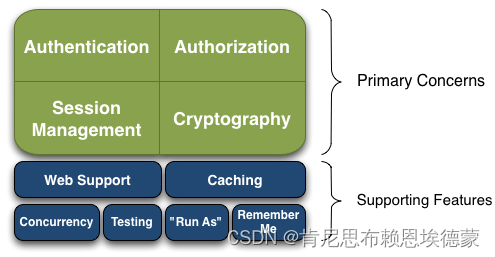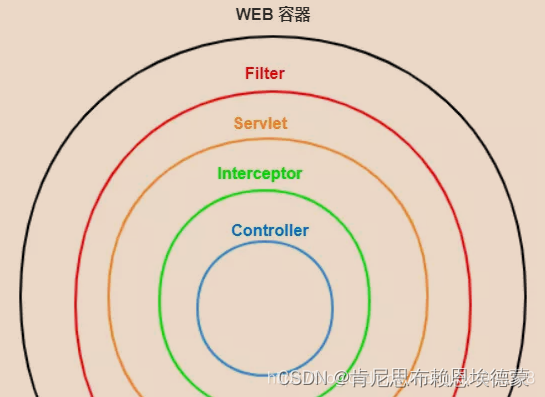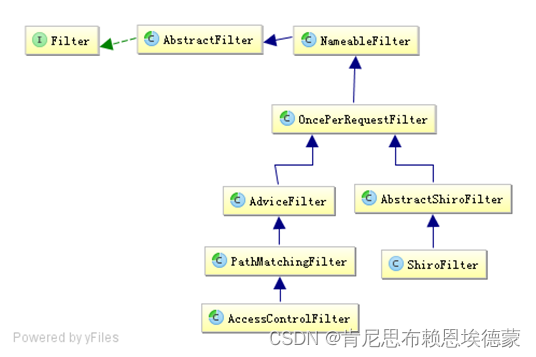0. 感觉算是源码最简单的框架了吧,也可能是之前接触过了的原因…
借助源码走读的方法,理一下shiro几个重要过程的脉络即可,还是想把重心放在spring-security
1. 简单过一下shiro的重要组件
这张图都传烂了…

1.1 从Subject开始顺藤摸瓜
// org.apache.shiro.SecurityUtils#getSubject
public static Subject getSubject() {
Subject subject = ThreadContext.getSubject();
if (subject == null) {
subject = (new Subject.Builder()).buildSubject();
ThreadContext.bind(subject);
}
return subject;
}
// org.apache.shiro.util.ThreadContext#bind(org.apache.shiro.subject.Subject)
public static void bind(Subject subject) {
if (subject != null) {
put(SUBJECT_KEY, subject);
}
}
// org.apache.shiro.util.ThreadContext#put
private static final ThreadLocal<Map<Object, Object>> resources = new InheritableThreadLocalMap<Map<Object, Object>>();
public static void put(Object key, Object value) {
if (key == null) {
throw new IllegalArgumentException("key cannot be null");
}
if (value == null) {
remove(key);
return;
}
resources.get().put(key, value);
if (log.isTraceEnabled()) {
String msg = "Bound value of type [" + value.getClass().getName() + "] for key [" +
key + "] to thread " + "[" + Thread.currentThread().getName() + "]";
log.trace(msg);
}
}
1.2 借助简单的登陆过程,过眼一下其他的几个组件
// org.apache.shiro.subject.support.DelegatingSubject#login
public void login(AuthenticationToken token) throws AuthenticationException {
clearRunAsIdentitiesInternal();
Subject subject = securityManager.login(this, token);
PrincipalCollection principals;
String host = null;
if (subject instanceof DelegatingSubject) {
DelegatingSubject delegating = (DelegatingSubject) subject;
//we have to do this in case there are assumed identities - we don't want to lose the 'real' principals:
principals = delegating.principals;
host = delegating.host;
} else {
principals = subject.getPrincipals();
}
if (principals == null || principals.isEmpty()) {
String msg = "Principals returned from securityManager.login( token ) returned a null or " +
"empty value. This value must be non null and populated with one or more elements.";
throw new IllegalStateException(msg);
}
this.principals = principals;
this.authenticated = true;
if (token instanceof HostAuthenticationToken) {
host = ((HostAuthenticationToken) token).getHost();
}
if (host != null) {
this.host = host;
}
Session session = subject.getSession(false);
if (session != null) {
this.session = decorate(session);
} else {
this.session = null;
}
}
// org.apache.shiro.mgt.DefaultSecurityManager#login
public Subject login(Subject subject, AuthenticationToken token) throws AuthenticationException {
AuthenticationInfo info;
try {
info = authenticate(token);
} catch (AuthenticationException ae) {
try {
onFailedLogin(token, ae, subject);
} catch (Exception e) {
if (log.isInfoEnabled()) {
log.info("onFailedLogin method threw an " +
"exception. Logging and propagating original AuthenticationException.", e);
}
}
throw ae; //propagate
}
Subject loggedIn = createSubject(token, info, subject);
onSuccessfulLogin(token, info, loggedIn);
return loggedIn;
}
// org.apache.shiro.authc.AbstractAuthenticator#authenticate
public final AuthenticationInfo authenticate(AuthenticationToken token) throws AuthenticationException {
if (token == null) {
throw new IllegalArgumentException("Method argumet (authentication token) cannot be null.");
}
log.trace("Authentication attempt received for token [{}]", token);
AuthenticationInfo info;
try {
info = doAuthenticate(token);
if (info == null) {
String msg = "No account information found for authentication token [" + token + "] by this " +
"Authenticator instance. Please check that it is configured correctly.";
throw new AuthenticationException(msg);
}
} catch (Throwable t) {
AuthenticationException ae = null;
if (t instanceof AuthenticationException) {
ae = (AuthenticationException) t;
}
if (ae == null) {
//Exception thrown was not an expected AuthenticationException. Therefore it is probably a little more
//severe or unexpected. So, wrap in an AuthenticationException, log to warn, and propagate:
String msg = "Authentication failed for token submission [" + token + "]. Possible unexpected " +
"error? (Typical or expected login exceptions should extend from AuthenticationException).";
ae = new AuthenticationException(msg, t);
}
try {
notifyFailure(token, ae);
} catch (Throwable t2) {
if (log.isWarnEnabled()) {
String msg = "Unable to send notification for failed authentication attempt - listener error?. " +
"Please check your AuthenticationListener implementation(s). Logging sending exception " +
"and propagating original AuthenticationException instead...";
log.warn(msg, t2);
}
}
throw ae;
}
log.debug("Authentication successful for token [{}]. Returned account [{}]", token, info);
notifySuccess(token, info);
return info;
}
// org.apache.shiro.authc.pam.ModularRealmAuthenticator#doAuthenticate
protected AuthenticationInfo doAuthenticate(AuthenticationToken authenticationToken) throws AuthenticationException {
assertRealmsConfigured();
Collection<Realm> realms = getRealms();
if (realms.size() == 1) {
return doSingleRealmAuthentication(realms.iterator().next(), authenticationToken);
} else {
return doMultiRealmAuthentication(realms, authenticationToken);
}
}
// org.apache.shiro.authc.pam.ModularRealmAuthenticator#doMultiRealmAuthentication
protected AuthenticationInfo doMultiRealmAuthentication(Collection<Realm> realms, AuthenticationToken token) {
AuthenticationStrategy strategy = getAuthenticationStrategy();
AuthenticationInfo aggregate = strategy.beforeAllAttempts(realms, token);
if (log.isTraceEnabled()) {
log.trace("Iterating through {} realms for PAM authentication", realms.size());
}
for (Realm realm : realms) {
aggregate = strategy.beforeAttempt(realm, token, aggregate);
if (realm.supports(token)) {
log.trace("Attempting to authenticate token [{}] using realm [{}]", token, realm);
AuthenticationInfo info = null;
Throwable t = null;
try {
info = realm.getAuthenticationInfo(token);
} catch (Throwable throwable) {
t = throwable;
if (log.isDebugEnabled()) {
String msg = "Realm [" + realm + "] threw an exception during a multi-realm authentication attempt:";
log.debug(msg, t);
}
}
aggregate = strategy.afterAttempt(realm, token, info, aggregate, t);
} else {
log.debug("Realm [{}] does not support token {}. Skipping realm.", realm, token);
}
}
aggregate = strategy.afterAllAttempts(token, aggregate);
return aggregate;
}
// org.apache.shiro.realm.AuthenticatingRealm#getAuthenticationInfo
public final AuthenticationInfo getAuthenticationInfo(AuthenticationToken token) throws AuthenticationException {
AuthenticationInfo info = getCachedAuthenticationInfo(token);
if (info == null) {
//otherwise not cached, perform the lookup:
info = doGetAuthenticationInfo(token);
log.debug("Looked up AuthenticationInfo [{}] from doGetAuthenticationInfo", info);
if (token != null && info != null) {
cacheAuthenticationInfoIfPossible(token, info);
}
} else {
log.debug("Using cached authentication info [{}] to perform credentials matching.", info);
}
if (info != null) {
assertCredentialsMatch(token, info);
} else {
log.debug("No AuthenticationInfo found for submitted AuthenticationToken [{}]. Returning null.", token);
}
return info;
}
-------------------------
// org.apache.shiro.realm.SimpleAccountRealm#doGetAuthenticationInfo
// IniRealm extends TextConfigurationRealm
protected AuthenticationInfo doGetAuthenticationInfo(AuthenticationToken token) throws AuthenticationException {
UsernamePasswordToken upToken = (UsernamePasswordToken) token;
SimpleAccount account = getUser(upToken.getUsername());
if (account != null) {
if (account.isLocked()) {
throw new LockedAccountException("Account [" + account + "] is locked.");
}
if (account.isCredentialsExpired()) {
String msg = "The credentials for account [" + account + "] are expired";
throw new ExpiredCredentialsException(msg);
}
}
return account;
}
-------------------
// org.apache.shiro.realm.AuthenticatingRealm#assertCredentialsMatch
protected void assertCredentialsMatch(AuthenticationToken token, AuthenticationInfo info) throws AuthenticationException {
CredentialsMatcher cm = getCredentialsMatcher();
if (cm != null) {
if (!cm.doCredentialsMatch(token, info)) {
//not successful - throw an exception to indicate this:
String msg = "Submitted credentials for token [" + token + "] did not match the expected credentials.";
throw new IncorrectCredentialsException(msg);
}
} else {
throw new AuthenticationException("A CredentialsMatcher must be configured in order to verify " +
"credentials during authentication. If you do not wish for credentials to be examined, you " +
"can configure an " + AllowAllCredentialsMatcher.class.getName() + " instance.");
}
}
// org.apache.shiro.authc.credential.PasswordMatcher#doCredentialsMatch
public boolean doCredentialsMatch(AuthenticationToken token, AuthenticationInfo info) {
PasswordService service = ensurePasswordService();
Object submittedPassword = getSubmittedPassword(token);
Object storedCredentials = getStoredPassword(info);
assertStoredCredentialsType(storedCredentials);
if (storedCredentials instanceof Hash) {
Hash hashedPassword = (Hash)storedCredentials;
HashingPasswordService hashingService = assertHashingPasswordService(service);
return hashingService.passwordsMatch(submittedPassword, hashedPassword);
}
//otherwise they are a String (asserted in the 'assertStoredCredentialsType' method call above):
String formatted = (String)storedCredentials;
return passwordService.passwordsMatch(submittedPassword, formatted);
}
// org.apache.shiro.authc.credential.DefaultPasswordService#passwordsMatch(java.lang.Object, java.lang.String)
public boolean passwordsMatch(Object submittedPlaintext, String saved) {
ByteSource plaintextBytes = createByteSource(submittedPlaintext);
if (saved == null || saved.length() == 0) {
return plaintextBytes == null || plaintextBytes.isEmpty();
} else {
if (plaintextBytes == null || plaintextBytes.isEmpty()) {
return false;
}
}
//First check to see if we can reconstitute the original hash - this allows us to
//perform password hash comparisons even for previously saved passwords that don't
//match the current HashService configuration values. This is a very nice feature
//for password comparisons because it ensures backwards compatibility even after
//configuration changes.
HashFormat discoveredFormat = this.hashFormatFactory.getInstance(saved);
if (discoveredFormat != null && discoveredFormat instanceof ParsableHashFormat) {
ParsableHashFormat parsableHashFormat = (ParsableHashFormat)discoveredFormat;
Hash savedHash = parsableHashFormat.parse(saved);
return passwordsMatch(submittedPlaintext, savedHash);
}
//If we're at this point in the method's execution, We couldn't reconstitute the original hash.
//So, we need to hash the submittedPlaintext using current HashService configuration and then
//compare the formatted output with the saved string. This will correctly compare passwords,
//but does not allow changing the HashService configuration without breaking previously saved
//passwords:
//The saved text value can't be reconstituted into a Hash instance. We need to format the
//submittedPlaintext and then compare this formatted value with the saved value:
HashRequest request = createHashRequest(plaintextBytes);
Hash computed = this.hashService.computeHash(request);
String formatted = this.hashFormat.format(computed);
return saved.equals(formatted);
}
-------------------
// org.apache.shiro.authc.credential.SimpleCredentialsMatcher#doCredentialsMatch
public boolean doCredentialsMatch(AuthenticationToken token, AuthenticationInfo info) {
Object tokenCredentials = getCredentials(token);
Object accountCredentials = getCredentials(info);
return equals(tokenCredentials, accountCredentials);
}
// org.apache.shiro.authc.credential.SimpleCredentialsMatcher#equals
protected boolean equals(Object tokenCredentials, Object accountCredentials) {
if (log.isDebugEnabled()) {
log.debug("Performing credentials equality check for tokenCredentials of type [" +
tokenCredentials.getClass().getName() + " and accountCredentials of type [" +
accountCredentials.getClass().getName() + "]");
}
if (isByteSource(tokenCredentials) && isByteSource(accountCredentials)) {
if (log.isDebugEnabled()) {
log.debug("Both credentials arguments can be easily converted to byte arrays. Performing " +
"array equals comparison");
}
byte[] tokenBytes = toBytes(tokenCredentials);
byte[] accountBytes = toBytes(accountCredentials);
return Arrays.equals(tokenBytes, accountBytes);
} else {
return accountCredentials.equals(tokenCredentials);
}
}
2. 集成到web环境
springMVC作为web框架,也有自己的逻辑,但这并不会与shiro集成冲突,shiro集成到web的做法是:接管webFilterChain

Shiro的Filter有两类同构(OncePerRequestFilter)的实现:
- ShiroFilter:接管Web的FilterChain,并插入一段 shiro 的FilerChain
- AdviceFilter:执行shiro认证逻辑

2.1 OncePerRequestFilter:shiro拦截器都是从这个入口开始
// org.apache.shiro.web.servlet.OncePerRequestFilter
public abstract class OncePerRequestFilter extends NameableFilter {
public final void doFilter(ServletRequest request, ServletResponse response, FilterChain filterChain)
throws ServletException, IOException {
String alreadyFilteredAttributeName = getAlreadyFilteredAttributeName();
// 该filter已经被调用,则继续调用servletFilter(此时所有shiro的adviceFilter的FilterChain均执行完毕)
if ( request.getAttribute(alreadyFilteredAttributeName) != null ) {
log.trace("Filter '{}' already executed. Proceeding without invoking this filter.", getName());
filterChain.doFilter(request, response);
// 不需要使用shiro-web权限控制
} else //noinspection deprecation
if (/* added in 1.2: */ !isEnabled(request, response) ||
/* retain backwards compatibility: */ shouldNotFilter(request) ) {
log.debug("Filter '{}' is not enabled for the current request. Proceeding without invoking this filter.",
getName());
filterChain.doFilter(request, response);
// 开始调度执行shiro的FilterChain
} else {
// Do invoke this filter...
log.trace("Filter '{}' not yet executed. Executing now.", getName());
request.setAttribute(alreadyFilteredAttributeName, Boolean.TRUE);
try {
// 由此可见 doFilter() -> doFilterInternal()
// 该方法由其子类AbstractShiroFilter实现
// 入参中的filterChain属于是servletFilterChain
doFilterInternal(request, response, filterChain);
} finally {
// Once the request has finished, we're done and we don't
// need to mark as 'already filtered' any more.
request.removeAttribute(alreadyFilteredAttributeName);
}
}
}
protected abstract void doFilterInternal(ServletRequest request, ServletResponse response, FilterChain chain)
throws ServletException, IOException;
}
2.1.1 ShiroFilter:插入一段Shiro的FilterChain
// org.apache.shiro.web.servlet.AbstractShiroFilter
public abstract class AbstractShiroFilter extends OncePerRequestFilter {
// Reference to the security manager used by this filter
private WebSecurityManager securityManager;
// Used to determine which chain should handle an incoming request/response
private FilterChainResolver filterChainResolver;
protected void doFilterInternal(ServletRequest servletRequest, ServletResponse servletResponse, final FilterChain chain)
throws ServletException, IOException {
Throwable t = null;
try {
final ServletRequest request = prepareServletRequest(servletRequest, servletResponse, chain);
final ServletResponse response = prepareServletResponse(request, servletResponse, chain);
// return new WebSubject.Builder(getSecurityManager(), request, response).buildWebSubject();
final Subject subject = createSubject(request, response);
//noinspection unchecked
subject.execute(new Callable() {
public Object call() throws Exception {
updateSessionLastAccessTime(request, response);
executeChain(request, response, chain);
return null;
}
});
} catch (ExecutionException ex) {
t = ex.getCause();
} catch (Throwable throwable) {
t = throwable;
}
if (t != null) {
if (t instanceof ServletException) {
throw (ServletException) t;
}
if (t instanceof IOException) {
throw (IOException) t;
}
//otherwise it's not one of the two exceptions expected by the filter method signature - wrap it in one:
String msg = "Filtered request failed.";
throw new ServletException(msg, t);
}
}
protected void executeChain(ServletRequest request, ServletResponse response, FilterChain origChain)
throws IOException, ServletException {
FilterChain chain = getExecutionChain(request, response, origChain);
chain.doFilter(request, response);
}
protected FilterChain getExecutionChain(ServletRequest request, ServletResponse response, FilterChain origChain) {
FilterChain chain = origChain;
FilterChainResolver resolver = getFilterChainResolver();
if (resolver == null) {
log.debug("No FilterChainResolver configured. Returning original FilterChain.");
return origChain;
}
// step into ...
FilterChain resolved = resolver.getChain(request, response, origChain);
if (resolved != null) {
log.trace("Resolved a configured FilterChain for the current request.");
chain = resolved;
} else {
log.trace("No FilterChain configured for the current request. Using the default.");
}
return chain;
}
}
2.1.1.1 PathMatchingFilterChainResolver:获取请求URL对应的校验AdviceFilterChain
// package org.apache.shiro.web.filter.mgt;
public class PathMatchingFilterChainResolver implements FilterChainResolver {
// shiroFilterChain的manager
private FilterChainManager filterChainManager;
private PatternMatcher pathMatcher;
private static final String DEFAULT_PATH_SEPARATOR = "/";
public FilterChain getChain(ServletRequest request, ServletResponse response, FilterChain originalChain) {
FilterChainManager filterChainManager = getFilterChainManager();
if (!filterChainManager.hasChains()) {
return null;
}
String requestURI = getPathWithinApplication(request);
// in spring web, the requestURI "/resource/menus" ---- "resource/menus/" bose can access the resource
// but the pathPattern match "/resource/menus" can not match "resource/menus/"
// user can use requestURI + "/" to simply bypassed chain filter, to bypassed shiro protect
if(requestURI != null && !DEFAULT_PATH_SEPARATOR.equals(requestURI)
&& requestURI.endsWith(DEFAULT_PATH_SEPARATOR)) {
requestURI = requestURI.substring(0, requestURI.length() - 1);
}
//the 'chain names' in this implementation are actually path patterns defined by the user. We just use them
//as the chain name for the FilterChainManager's requirements
for (String pathPattern : filterChainManager.getChainNames()) {
if (pathPattern != null && !DEFAULT_PATH_SEPARATOR.equals(pathPattern)
&& pathPattern.endsWith(DEFAULT_PATH_SEPARATOR)) {
pathPattern = pathPattern.substring(0, pathPattern.length() - 1);
}
// If the path does match, then pass on to the subclass implementation for specific checks:
if (pathMatches(pathPattern, requestURI)) {
if (log.isTraceEnabled()) {
log.trace("Matched path pattern [" + pathPattern + "] for requestURI [" + Encode.forHtml(requestURI) + "]. " +
"Utilizing corresponding filter chain...");
}
// step into ...
// url命中之后,返回其shiro认证的filter代理
return filterChainManager.proxy(originalChain, pathPattern);
}
}
return null;
}
protected boolean pathMatches(String pattern, String path) {
PatternMatcher pathMatcher = getPathMatcher();
return pathMatcher.matches(pattern, path);
}
}
2.1.1.2 FilterChainManager:返回请求URL对应的Shiro的FilterChain的代理
// package org.apache.shiro.web.filter.mgt;
public class DefaultFilterChainManager implements FilterChainManager {
private FilterConfig filterConfig;
private Map<String, Filter> filters; //pool of filters available for creating chains
private Map<String, NamedFilterList> filterChains; //key: chain name, value: chain
public FilterChain proxy(FilterChain original, String chainName) {
NamedFilterList configured = getChain(chainName);
if (configured == null) {
String msg = "There is no configured chain under the name/key [" + chainName + "].";
throw new IllegalArgumentException(msg);
}
return configured.proxy(original);
}
public NamedFilterList getChain(String chainName) {
return this.filterChains.get(chainName);
}
}
2.1.1.3 NamedFilterList:Shiro的FilterChain底层使用的List<Filter>
// org.apache.shiro.web.filter.mgt.SimpleNamedFilterList
public class SimpleNamedFilterList implements NamedFilterList {
private String name;
private List<Filter> backingList;
public FilterChain proxy(FilterChain orig) {
return new ProxiedFilterChain(orig, this);
}
}
2.1.1.4 ProxiedFilterChain:Shiro的FilterChain代理类
// package org.apache.shiro.web.servlet;
public class ProxiedFilterChain implements FilterChain {
// servletFilterChain
private FilterChain orig;
private List<Filter> filters;
// 拦截器执行链的索引
private int index = 0;
public ProxiedFilterChain(FilterChain orig, List<Filter> filters) {
if (orig == null) {
throw new NullPointerException("original FilterChain cannot be null.");
}
this.orig = orig;
this.filters = filters;
this.index = 0;
}
public void doFilter(ServletRequest request, ServletResponse response) throws IOException, ServletException {
if (this.filters == null || this.filters.size() == this.index) {
//we've reached the end of the wrapped chain, so invoke the original one:
if (log.isTraceEnabled()) {
log.trace("Invoking original filter chain.");
}
// 调用servletFilter
this.orig.doFilter(request, response);
} else {
if (log.isTraceEnabled()) {
log.trace("Invoking wrapped filter at index [" + this.index + "]");
}
// 调用shiroFilter
this.filters.get(this.index++).doFilter(request, response, this);
}
}
}
2.1.2 AdviceFilter:Shiro校验逻辑的Filter
这个类命名应该也是想传递源码中的AOP风格
// package org.apache.shiro.web.servlet;
public abstract class AdviceFilter extends OncePerRequestFilter {
protected boolean preHandle(ServletRequest request, ServletResponse response) throws Exception {
return true;
}
protected void postHandle(ServletRequest request, ServletResponse response) throws Exception {
}
public void afterCompletion(ServletRequest request, ServletResponse response, Exception exception) throws Exception {
}
// 两种类型的OncePerRequestFilter的子类均实现该方法(废话):
// doFilter() -> doFilterInternal()
public void doFilterInternal(ServletRequest request, ServletResponse response, FilterChain chain)
throws ServletException, IOException {
Exception exception = null;
try {
boolean continueChain = preHandle(request, response);
if (log.isTraceEnabled()) {
log.trace("Invoked preHandle method. Continuing chain?: [" + continueChain + "]");
}
if (continueChain) {
// shiroFilterChain的演进方法
// 调用下一个拦截器:doFilter() -> doFilterInternal() ...
executeChain(request, response, chain);
}
postHandle(request, response);
if (log.isTraceEnabled()) {
log.trace("Successfully invoked postHandle method");
}
} catch (Exception e) {
exception = e;
} finally {
// afterCompletion回调方法在这里被调用
cleanup(request, response, exception);
}
}
protected void executeChain(ServletRequest request, ServletResponse response, FilterChain chain) throws Exception {
chain.doFilter(request, response);
}
protected void cleanup(ServletRequest request, ServletResponse response, Exception existing)
throws ServletException, IOException {
Exception exception = existing;
try {
afterCompletion(request, response, exception);
if (log.isTraceEnabled()) {
log.trace("Successfully invoked afterCompletion method.");
}
} catch (Exception e) {
if (exception == null) {
exception = e;
} else {
log.debug("afterCompletion implementation threw an exception. This will be ignored to " +
"allow the original source exception to be propagated.", e);
}
}
if (exception != null) {
if (exception instanceof ServletException) {
throw (ServletException) exception;
} else if (exception instanceof IOException) {
throw (IOException) exception;
} else {
if (log.isDebugEnabled()) {
String msg = "Filter execution resulted in an unexpected Exception " +
"(not IOException or ServletException as the Filter API recommends). " +
"Wrapping in ServletException and propagating.";
log.debug(msg);
}
throw new ServletException(exception);
}
}
}
}
3. 集成到Spring-ioc容器
springMvc,其实是 WebApplicationContext
// org.apache.shiro.spring.web.ShiroFilterFactoryBean
public class ShiroFilterFactoryBean implements FactoryBean, BeanPostProcessor {
public Object getObject() throws Exception {
if (instance == null) {
// step into ...
instance = createInstance();
}
return instance;
}
protected AbstractShiroFilter createInstance() throws Exception {
log.debug("Creating Shiro Filter instance.");
// 这个manager是webSecurityManager,管理权限认证的
SecurityManager securityManager = getSecurityManager();
if (securityManager == null) {
String msg = "SecurityManager property must be set.";
throw new BeanInitializationException(msg);
}
if (!(securityManager instanceof WebSecurityManager)) {
String msg = "The security manager does not implement the WebSecurityManager interface.";
throw new BeanInitializationException(msg);
}
// 这个manager的作用是:SpringShiroFilter作为OncePerRequestFilter
// 作为所有请求的入口时,接管FilterChain的调度
// 换了方式说:servlet的默认FilterChain将委托给SpringShrioFilter来调度
FilterChainManager manager = createFilterChainManager();
//Expose the constructed FilterChainManager by first wrapping it in a
// FilterChainResolver implementation. The AbstractShiroFilter implementations
// do not know about FilterChainManagers - only resolvers:
PathMatchingFilterChainResolver chainResolver = new PathMatchingFilterChainResolver();
chainResolver.setFilterChainManager(manager);
//Now create a concrete ShiroFilter instance and apply the acquired SecurityManager and built
//FilterChainResolver. It doesn't matter that the instance is an anonymous inner class
//here - we're just using it because it is a concrete AbstractShiroFilter instance that accepts
// step into ...
//injection of the SecurityManager and FilterChainResolver:
return new SpringShiroFilter((WebSecurityManager) securityManager, chainResolver);
}
private static final class SpringShiroFilter extends AbstractShiroFilter {
protected SpringShiroFilter(WebSecurityManager webSecurityManager, FilterChainResolver resolver) {
super();
if (webSecurityManager == null) {
throw new IllegalArgumentException("WebSecurityManager property cannot be null.");
}
setSecurityManager(webSecurityManager);
if (resolver != null) {
setFilterChainResolver(resolver);
}
}
}
}






















 1565
1565











 被折叠的 条评论
为什么被折叠?
被折叠的 条评论
为什么被折叠?










